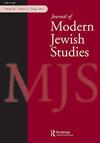Sabbatai,Sebastião:“一个balada do falso mesias”中的沉浸与异化
IF 0.4
0 HUMANITIES, MULTIDISCIPLINARY
引用次数: 0
摘要
:巴西犹太作家Moacyr Scliar的短篇小说“一个balada do falso弥赛亚”告诉了20世纪初犹太人来到南里奥格兰德州的时代错误版本,其中包括Sabbatai Zevi的历史人物。斯克利亚尔使用了不合时宜、戏仿和非现实主义的表现,以及不同文学传统和历史参考的融合,有助于解决犹太裔巴西身份内部的固有冲突。他对名义上的虚假弥赛亚的描述不仅呼应和戏仿了历史上的泽维,也呼应和戏谑了基督教和葡语弥赛亚人物。通过引入一系列悖论和矛盾,叙事表明犹太人融入巴西社会的过程不是通过同化,而是通过与世隔绝和反叛。对故事隐含作者的分析表明,这是这个过程的结果。本文章由计算机程序翻译,如有差异,请以英文原文为准。
Sabbatai, Sebastião: immersion and dissimilation in “A balada do falso messias”
: The short story “A balada do falso messias”, by the Brazilian Jewish writer Moacyr Scliar, tells an anachronistic version of the arrival of Jews to Rio Grande do Sul in the early 1900s, which includes the historical character of Sabbatai Zevi. Scliar’s use of anachronism, parody and non-realistic representation, as well as the amalgamation of different literary traditions and historical references, serve to problematize the inherent conflicts within Jewish Brazilian identity. His version of the titular false messiah echoes and parodies not only the historical Zevi but also Christian and Lusophone messianic figures. By introducing a series of paradoxes and contradictions, the narrative suggests a process of Jewish immersion in Brazilian society not by assimilation, but rather by seclusion and rebellion. An analysis of the story’s implicit author presents it as the result of such process.
求助全文
通过发布文献求助,成功后即可免费获取论文全文。
去求助
来源期刊

Journal of Modern Jewish Studies
HUMANITIES, MULTIDISCIPLINARY-
CiteScore
0.70
自引率
0.00%
发文量
75
 求助内容:
求助内容: 应助结果提醒方式:
应助结果提醒方式:


